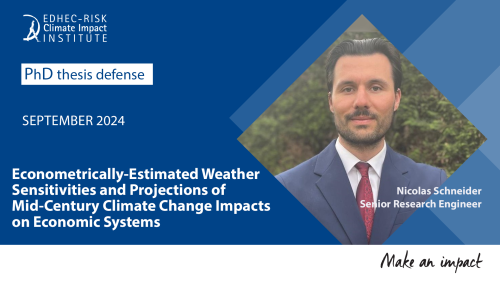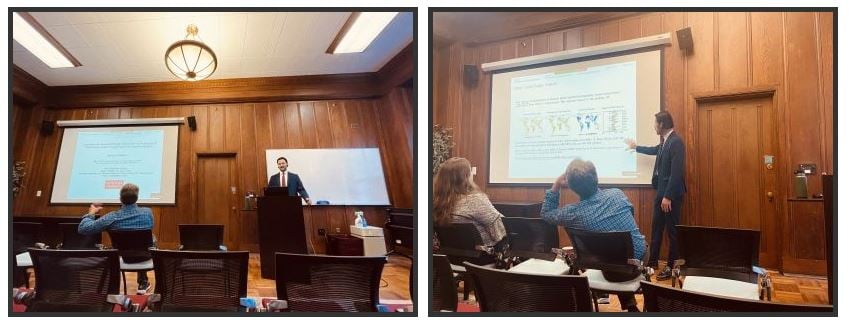
Nicolas Schneider Successfully Defends Doctoral Thesis on Climate Change Impacts on Economic Systems
Written on 10 Oct 2024.

We are delighted to announce that Nicolas Schneider, Senior Research Engineer and Empirical Macroeconomist at EDHEC-Risk Climate Impact Institute successfully defended his doctoral thesis entitled “Econometrically-Estimated Weather Sensitivities and Projections of Mid-Century Climate Change Impacts on Economic Systems” on September 30, 2024.
His dissertation, supervised by Dr Ian Sue Wing, Professor at Boston University, empirically quantifies climate change impacts on key economic systems: agriculture, energy and health. In the three sectors, he highlights how the balance of forces has played out historically and geographically and what, given both supply and demand-side determinants, the likely economic implications are circa-2050. His doctoral background is rooted around large-scale processing of high-resolution climatic fields through High Performance Computing (HPC) systems and long-term projection of climate shift-driven changes on economic outcomes via climate econometrics.

For instance, he used a panel dataset of gridded annual crop yields and investigated the global temperature, precipitation, CFE (Climate Feedback Effect) and irrigation responses of four crops responsible for 75% of world’s calorie intake. Projecting climatically-driven changes, by coupling their estimated elasticities with an ensemble of Global Climate Model (GCM) mid-century simulations, they found substantial agreement on average offsetting effects of the CFE on weather-driven crop yield losses. This implies that embedding country-aggregated yield shocks within a Log-linear Heckscher-Ohlin Computable General Equilibrium (CGE) framework of global agricultural supply would modify our understanding of the macro-scaled land supply and price implications derived from micro-level adjustments to mid-century climate shifts.
His manuscript will be available online soon.
At EDHEC-Risk Climate, Nicolas is working on expanding our capabilities in spatial climate econometrics, allowing us to parametrize and therefore project and distribute the impact of climate change on the economy following major warming scenarios from CMIP6. Prior to joining EDHEC Business School, Nicolas taught at Harvard University and in the Quantitative Methods Seminar of the Oxford Smith School. He has also been involved in consulting, including for the New York City's Mayor Office of Climate.

